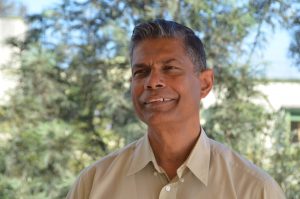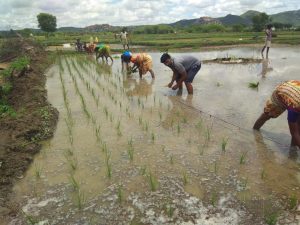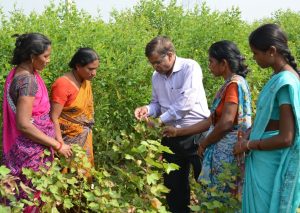

India possesses all the capabilities to achieve rapid progress and growth and bring about a transformation in the lives of urban and rural people. For that, we must collectively strive to eradicate poverty, illiteracy and discrimination and bring equality and welfare. We had a discussion with Crispino Lobo, Co-Founder and Managing Trustee of Watershed Organisation Trust (WOTR), who is well regarded in the national and international development circles for his knowledge and achievements in natural resource management, participatory watershed development and integrated water resources management. Crispino has also contributed to Central and State Policy level changes through participation in several committees. His contributions at the Pre-Budget Consultations on Agriculture, in which he has regularly participated for the last 22 years, led to the establishment of the Watershed Development Fund (WDF) and the National Adaptation Fund for Climate Change (NAFCC) at the MoEF&CC. CSR Mandate spoke with him to discuss how India can achieve its sustainable development, social welfare and climate change goals.
Tell us about Watershed Organisation Trust (WOTR). What are the core values and approaches of WOTR?
 Watershed Organisation Trust (WOTR), established in 1993, is a non-profit that engages at the intersection of practice, knowledge and policy across scales and, in collaboration with various stakeholders across sectors.
Watershed Organisation Trust (WOTR), established in 1993, is a non-profit that engages at the intersection of practice, knowledge and policy across scales and, in collaboration with various stakeholders across sectors.
Our goal is to ensure water, food, livelihoods and income security together with a growing quality of  life to vulnerable and disadvantaged communities in rural areas on a sustainable and equitable basis.
life to vulnerable and disadvantaged communities in rural areas on a sustainable and equitable basis.
We work in the following areas: watershed development and eco-systems management, integrated water resources management, climate-resilient agriculture, sustainable rural livelihoods, biodiversity, women’s empowerment, nutrition,  health, sanitation and hygiene. Cross-cutting thematics across these areas include adaptation and resilience to climate change, institutional development, governance and policy engagement. We work closely with civil society entities, companies, and the central, federal and State governments to achieve these objectives.
health, sanitation and hygiene. Cross-cutting thematics across these areas include adaptation and resilience to climate change, institutional development, governance and policy engagement. We work closely with civil society entities, companies, and the central, federal and State governments to achieve these objectives.
As of September 2021, in collaboration with its affiliates and partners, we worked in over 5,550 villages across nine Indian States – Maharashtra, Telangana, Andhra Pradesh, Madhya Pradesh, Rajasthan, Jharkhand, Bihar, Chhattisgarh and Odisha. It has impacted more than 4.7 million people, trained over 576,000 people from across India and 63 countries and collaborated with 230 NGOs/Project Implementing Agencies (PIAs). Moreover, it has promoted/supported nearly 16,000 SHGs involving about 200,000 women. During the pandemic, we undertook COVID relief works in 1145 villages across 38 districts in seven States impacting over 125,000 households.
WOTR and W-CReS adopt an integrated, participatory and systems-based approach to understanding and addressing developmental problems. Our interventions and works are across three broad verticals: (i) Implementation (ii) Research and Policy Advocacy and (iii) Training and Capacity Building.
To improve the effectiveness of developmental interventions and contribute to policy enablement and capacity building, we set up W-CReS. Initiated in 2007 but set up as an autonomous unit on December 20, 2016, W-CReS undertakes multi-stakeholder, applied research on ground level problems using a trans-disciplinary approach.
The rationale for establishing W-CReS is to bridge the gaps between science, policy and practice and promote multi-stakeholder collaboration at all levels. There exist considerable knowledge gaps in understanding vulnerability especially, arising from climate change, biodiversity loss and socio-economic change and implementing science-and-evidence-based risk mitigation and adaptation policies, programmes and practices.
W-CReS’s objectives are to understand causal relationships and drivers of behavioural change, identify and test effective strategies for change and contribute to learning, capacity building and policy enhancement. Towards this end, W-CReS has formal MOUs with leading scientific and academic institutions in India like the ICAR, IMD, CRIDA, etc.
The thematic areas W-CReS is engaged in are ecosystems/watershed management, integrated water resources management (surface and groundwater), climate-resilient agriculture, rural livelihoods, biodiversity, climate change adaptation, governance and local institutions.
As can be seen, WOTR and W-CReS adopt an integrated, participatory and systems-based approach to understanding and addressing developmental problems. Our interventions and works are across three broad verticals: (i) Implementation (ii) Research and Policy Advocacy and (iii) Training and Capacity Building.
These are the values that we hold dear: (i) Commitment (ii) Professionalism (iii) Transparency (iv) Inclusiveness (v) Integrity (vi) Creativity (vii) Reflection and introspection (viii) Gender Sensitivity, and (ix) Equity.
Do you think the role of NGOs, CSR arms and social welfare organisations will be more crucial in 2022 with the third wave of COVID-19?
Absolutely! Even during the first and second waves, NGOs, Corporates, civil society bodies and concerned citizens joined hands with the government and reached out to affected groups and communities across the country providing a plethora of services ranging from food, clothing, shelter, oxygen and medical supplies, informational, facilitation, training and counselling services, employment, livelihood support and financial assistance. Many individuals and agencies are continuing to provide services responding to local exigencies during the current third COVID-19 wave.
One forewarning and advisory initiative developed by us for farmers is an Android App called FarmPrecise that gives dynamic, weather-based, crop-specific advisories customised to the farm level, market information and some tools for better farm management and peer learning. Currently available in five languages, 49,000 farmers have downloaded the App. We hope to add additional services, including livestock management.
Climate change is now a major issue for every country. In such a scenario, do you think that NGOs and environment conservation organisations should revise their approach to motivate civil society to join hands with the cause?
With climate change affecting every aspect of life, the economy and the environment, development organisations and government agencies will need to identify areas and communities particularly vulnerable to climate risks, undertake mitigative and adaptive measures, improve communication infrastructure and rehabilitation services and invest in building the resilience and coping ability of communities at risk.
Accompanying this, more investments will need to be made in science and technology so that more accurate forecasting and forewarning systems are developed and effective advisory-response-and-rehabilitation mechanisms, tailored to meeting local exigencies are designed and established. Given that climate change is now a given and the poor are going to be the worst affected, we need to debate and put in place a well-funded composite safety net that would include health and livelihood insurance, cash and income transfers, food and shelter provisioning and affordable financing for recovery and restoration of livelihoods.
One forewarning and advisory initiative developed by us for farmers is an Android App called FarmPrecise that gives dynamic, weather-based, crop-specific advisories customised to the farm level, market information and some tools for better farm management and peer learning. Currently available in five languages, 49,000 farmers have downloaded the App. We hope to add additional services, including livestock management.


What are the top trends of the social welfare sector in 2022? And what are the key priorities of a social welfare organisation this year?
COVID has adversely affected the economy and communities across the country, especially the informal and SMME sectors. Reports and studies have shown that poor people have increased much more than before the pandemic; job and livelihood losses have drastically reduced household expenditures and many families have reduced their food intake – implying that hunger is a growing concern; unexpected medical expenses, besides the trauma of losing loved ones, have raised indebtedness levels and traumatised families.
The challenges before us are starkly clear: we will need to rehabilitate and help families cope with the traumas they have faced; facilitate investments in building skills, establishing enterprises and promoting viable employment and livelihood opportunities; improve market access and remunerative prices for farm produce and SMME products; put in place robust digital platforms that facilitate price, goods, services and markets discovery resulting in increased commerce and incomes; ensure sustained access and efficient transfers of public entitlements to those eligible; widen the coverage of insurance products, especially medical, and enhance funding for MGNREGA which provided a lifeline to countless families during the darkest days of the pandemic.
And yes, we will need to intensify our efforts in regenerating and rejuvenating ecosystems and water sources, conserving biodiversity and promoting social behaviours that improve health, hygiene and sanitation.
People in rural areas live in ecosystems and watersheds. They draw their sustenance and livelihoods from the resources that nature provides them. If the environment and its biodiversity are robust, the local community enjoys a markedly better quality of life than those living in environmentally degraded circumstances. This is because they have access to an enhanced and increased range of ecosystem services on which life and livelihoods depend.
The livelihood of rural India is based on agriculture. How can alternative sustainable livelihoods be created for rural communities in 2022?
Agriculture supports, directly and indirectly, the livelihoods of nearly 58 per cent of India’ population. There is scope for increasing its productivity and remunerations by adopting nature-based or nature-neutral cultivation and management technologies, precision farming techniques, better post-harvest storage systems, processing and value chain development, better market terms of trade and ensuring that a fair share of the value added is captured by the producers themselves.



With new opportunities opening up in the agricultural, digital, information technology, services (health, travel, hospitality, etc.) and knowledge sectors, there is a great need for technically qualified and skilled personnel. Improving the all-round quality of our human capital through rigorous in-class and on-the-job training, skilling, mentoring and internships that cover both hard and soft skills, would not only help meet the huge demand for competent personnel but also accelerate the churn to a $5 trillion economy.
Do you think that an ecosystem-based adaptation approach for all round development can be more impactful in current times?
Definitely! People in rural areas live in ecosystems and watersheds. They draw their sustenance and livelihoods from the resources that nature provides them.



If the environment and its biodiversity are robust, the local community enjoys a markedly better quality of life than those living in environmentally-degraded circumstances. This is because they have access to an enhanced and increased range of ecosystem services on which life and livelihoods depend. Human and natural communities living in biodiverse, vibrant and healthy ecosystems are better able to cope with and adapt to climate change and are more resilient to its impacts.
It is for this reason that on November 19, 2021, we launched W-CReS, in partnership with IDH and eight other partners, a collaborative known as ECOBARI – Ecosystems-based Adaptation for Resilient Incomes.

ECOBARI is a multi-stakeholder collaborative that facilitates joint action of committed individuals and institutions, representatives of government, civil society organisations, businesses, academia, NGOs, and media to enable communities to conserve their local biodiversity and restore and sustainably manage their natural resources aligned with the ecosystem they live. Its mission is to be a leading platform that grounds ecosystem-based adaptation at scale through multi-stakeholder partnerships, policy enablement and resource provisioning, to contribute to the country’s SDGs, the Land Degradation Neutrality targets and climate change commitments.
What is the goal and vision of WOTR in 2022 and beyond?
 Our Strategic Goals towards 2025 are:
Our Strategic Goals towards 2025 are:
- To help at least 2.9 million people on the road out of poverty in over 2,200 villages in several States in India.
- Regenerate watersheds and landscapes across 6,50,000 acres in 450 villages impacting 3,60,000 people.
- Make 250,000 acres of agricultural farms climate-resilient, sustainable and remunerative across 1,500 villages benefitting 7,20,000 people
- Upskill and enhance the capacities of over 8,80,000 villagers to improve their quality of life and of 2,500 development practitioners to effectively manage developmental initiatives.
- Set up an accredited educational and research institution of higher learning and excellence that imparts (i) credentialed professional and vocational education and training for employment and livelihoods (ii) conducts societally relevant applied research (iii) offers professional advisory, consultancy and technical services.
- Grow W-CReS (The WOTR Centre for Resilience Studies) as a thought leader and leading think tank for applied trans-disciplinary research in inclusive socio-economic development, ecosystems management and climate change adaptation.

